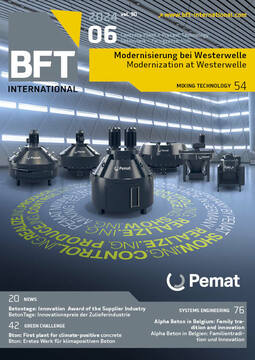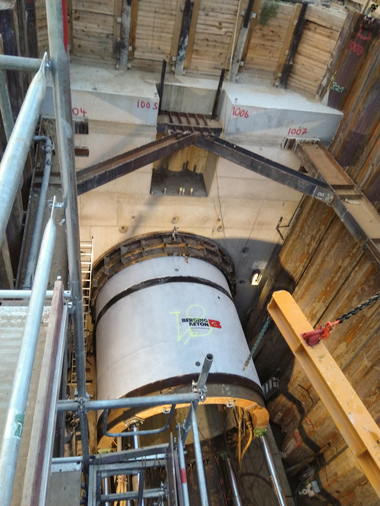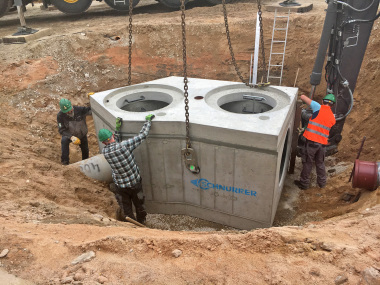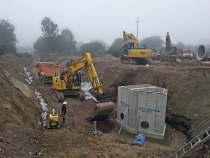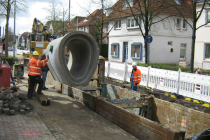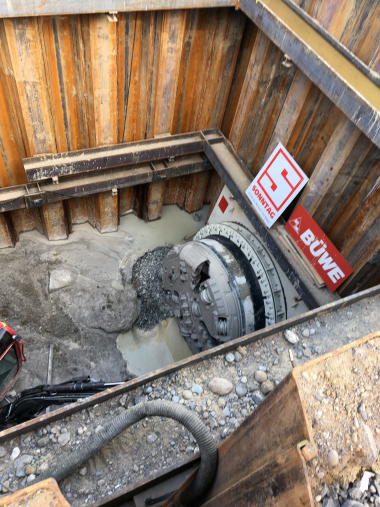Innovative storage sewer: Reinforced concrete pipes from Röser improve water quality in Stuttgart’s Feuerbach
A significant feature has been added to Stuttgart’s urban drainage system to preserve the water quality of the Feuerbach stream: A new storage sewer was installed that allows for temporary wastewater retention during rainy periods. As a result, significantly less dirt enters the Feuerbach. Reinforced concrete pipes from Röser GmbH were used for the storage sewer to reduce both costs and carbon emissions.
Previously, the existing combined sewer network on Stuttgart’s Feuerbach stream included a weak spot from a water management point of view created by a stormwater overflow structure located directly upstream of the inlet to the main sewage treatment plant. During heavy rainfall, diluted wastewater was discharged directly into the Feuerbach owing to the outdated installation because the sewer system and the treatment plant could not absorb such large volumes of stormwater.
For this reason, the Stuttgart water management authority commissioned Diem Baker, an engineering firm based in Ditzingen, with designing a modern combined water treatment system that meets the currently applicable high water quality standards. Implementing measures to reduce pollutant discharge and promote a healthy ecosystem is essential for ensuring the long-term resilience of the Feuerbach and its surroundings.
The newly installed storage sewer allows for temporary wastewater retention during rainy periods. As a result, significantly less dirt enters the Feuerbach. In addition, a fine screen was installed to retain solids in the sewer system during rainfalls in the event of an overflow of the storage sewer, which now occurs much less frequently than with the old structure.
Preliminary design and modification
In the fall of 2021, engineering firm Diem Baker based in Ditzingen approached Röser with initial questions regarding a number of structural solutions. In the preliminary design phase, a flexible plastic material was chosen, while concrete appeared to be unsuitable due to the very thin soil cover and confined space. During the detailed design phase, however, a clear tendency emerged in favor of concrete in the cost estimate when comparing the materials.
The high water levels regularly occurring in the flood zone of the Bachhalde catchment area above the ground level would have required considerable effort in terms of buoyancy control if the lightweight plastic material were chosen. Reinforced concrete pipes, however, turned out to be buoyancy-proof within the specified minimum cover when installed. Only a minimal soil cover in accordance with the design was required to ensure safe sewer operation in the event of flooding and water accumulation in the flood zone. In addition, several driveway crossings were built for heavy maintenance vehicles, which was an exceedingly easy and effortless process also in structural terms thanks to the reinforced concrete pipes used.
Significant carbon savings
Since no subsequent stabilization using geocomposites was required around the flexible pipes, it was even possible to reduce the trench width when using the reinforced concrete option, even though the wall thickness of the pipes is five to ten times greater. Not only did this approach drive down costs in the construction phase; it also reduced the required earthworks to some degree, resulting in a lower overall carbon impact from earth-moving operations. These considerations are particularly relevant in terms of sustainability and carbon emissions, especially in a city like Stuttgart that prioritizes ecological aspects.
The use of concrete is perfectly compatible with sustainability goals because the carbon footprint of reinforced concrete pipes proved to be considerably lower than that of other materials of comparable dimensions. This factor has a direct positive influence on additional aspects of the climate impact.
The use of reinforced concrete not only demonstrates its strength and adaptability in terms of load-bearing capacity; it also proves its sustainability. It was demonstrated that reinforced concrete can be reused, and it is already being used successfully as a recycled material for road subgrades. The option of reusing it as a high-quality recycled building material or in precast plants underscores the state-of-the-art circularity of this material.
This means that the up-and-coming concept of urban mining has direct relevance. Should the sewer require extension in 50 or 100 years from now, the reusability of reinforced concrete will provide an environmentally friendly and resource-efficient option.
Transportation and logistics
Röser products are manufactured exclusively in the State of Baden-Württemberg. Not only does the business attach great importance to local production and sourcing; it also focuses on efficient logistics. Cooperation with regional freight forwarders has proven its worth, particularly on construction sites that are difficult to access, which makes deliveries exceedingly dependable while strengthening the local economy by creating and retaining jobs and a skilled workforce.
Although only one pipe per truck could be transported in some cases, concrete was also the material of choice when it came to transportation. Each truck traveled about 170 kilometers, which is why there was no additional burden created by longer distances to be overcome for other materials – a clear benefit of the local approach to production. Since on-site storage of larger quantities was only possible to a limited extent, routes could be adjusted and scheduled accordingly.
Sudden changes in construction and environmental requirements
In the construction phase, the contractor was faced with sudden changes and additional environmental requirements. The local environmental authority required the pipes to be placed on a water-permeable bedding to ensure that groundwater could continue to circulate. This required the use of a mixture of sand and gravel with a preferred size of 2/32 mm.
A structural analysis was conducted for this installation alternative and supported by increasing the reinforcement ratio, which ensured that the difficult soil compaction near the pipe bottom was considered and compensated for structurally. This adjustment met the client’s requirement to make the bedding water-permeable while using the specified particle size and maintaining the structural integrity of the system.
Start of construction impacted by unexpected finds in the ground
Following adjustment of the reinforcement ratio, Röser produced the pipes at the plant in Steisslingen on Lake Constance. During the earthworks, several remains of reinforced concrete structures were discovered in the ground, which posed a challenge to Schwenk Unterensingen, the civil contractor. Notwithstanding this setback, they managed to demonstrate their expertise in sewer projects and put their experience to good use. Every centimeter counted in this setting, which is why all parties involved in the project were happy that the trench width was reduced by the redesign implemented before construction started. The pipes supplied by Röser had additional distinctive features. Among other details, a bend was required for the course of the sewer. To eliminate the need for an additional structure, a DN 3200 reinforced concrete elbow segment with an angle of about 15° was produced. In addition, a special fitting was manufactured for the reduction from DN 3200 to DN 2600, as well as a downstream tangential manhole.
Installation of the three pipe runs required a total time of about five months, including 50 linear meters of DN 2600 pipe, 24 meters of DN 3000 pipe, and 57 meters of DN 3200 pipe. The storage sewer part of the project was completed at the end of October 2023.











